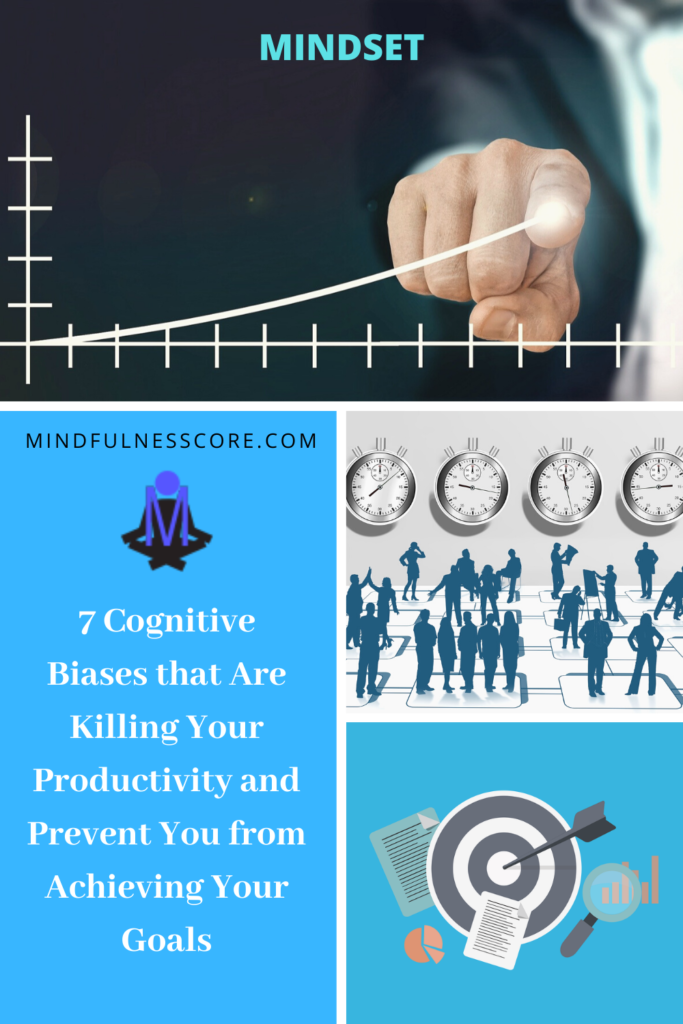7 Cognitive Biases that Are Killing Your Productivity and Prevent You from Achieving Your Goals
There is hardly anything that can parallel a human mind in terms of functionality. And yet if psychology teaches us one thing, it is that a human mind is prone to making mistakes as well. The imperfection of the mind can present itself in terms of a bad decision, miscalculation, or misjudgment in terms of the routine tasks. Having a firm understanding of this fact is of paramount importance for being humble and careful. If you try to remember, you can surely think of many instances where you were a little too confident of your mind; when you believed that your judgment regarding a person or situation is impeccable. Often times you would have thought that the only correct perspective of the situation is yours and the way that you can see reality is indeed flawless. It is not that we have to be embarrassed about the situation once we are proven wrong, but unfortunately, we end up making the situation worse because of our over-confidence on our minds. Making yourself capable of realizing that imperfection can be a part of your mind just like anybody else’s is, therefore, an indispensable component of personal growth.
If you are interested in learning more about the way a human mind functions, one of the imperative aspects that you must touch are the cognitive biases. Having the knowledge regarding what role such cognitive biases can play in our lives can help a great deal in making an improvement to your overall personality. Simply put, cognitive biases can be defined as the flawed thought patterns which kill productivity and leads to poor decision making. The aim of this article is to highlight 7 such biases to that you can be better equipped to recognize and tackle them the next time they make an appearance.
Underestimation
The first cognitive bias that is one of the leading causes of subpar productivity and a major hurdle in your path to achieving your goals is the bias of underestimation. Think about it, how many times have you been wrong in determining the amount of time that you’d require to complete a given task. Start from your academic life. Can’t you easily recall a number of instances when you thought that the given essay is only going to take a couple of hours to be completed? So you kept procrastinating until you were left with those last two hours before submission. Then you start working on it and you find out that you are going to need a lot more time than a couple of hours to finish this essay. This is a common example of a cognitive bias of underestimation that disables you to foresee the hindrance that you may face when you are actually working on the project.
A simple solution that can maximize your productivity and set you on the right track to achieve your goals is to always remind yourself that it is highly likely that your planning will turn out to be flawed. There must be a few barricades that you’ll have to cross; ones that you are not able to see for now. Develop a habit of starting on a given project as soon as possible. Take it slow in the beginning if you want. But this way you’ll always get an understanding of how long it is actually going to take right in the beginning. From there, you can decide on the pace that you’d like to keep to complete the task at hand.
Self-Denial
Another common cognitive bias that prevents you from unlocking your true potential is that of self-denial. Self-denial is a term used for your experiences when it is clearly evident for everyone else that you have made a mistake, and yet you refuse to accept it. You would rather invest more of your time, money, and energy into with a misplaced hope that it’ll work out for you at the end. A good example would be that of investing in a bad relationship. Somewhere along the way, it becomes evident that it was a poor decision and it is time to let it go. But rather than opting for logic, you choose to invest more of your time and energy into because you think that you have spent so much into it that the only option for you now is to make it work at any cost.
It’s understandable for you to try your best to avoid any mistake. However, the imperfection of your mind puts you at the risk of it anyways. What you need to realize in such circumstances, is that the sooner you accept that you have made a wrong decision, the sooner you can remedy for it. The common principle of a stock trader or any trader of the financial market applies here. You need to cut your losses as soon as possible so that you can prevent it from becoming a pattern for the future. Accepting a loss in the present is always more beneficial than keeping the losses into the future.
Overestimation
Much like underestimation, overestimation is another common cognitive bias that stands in the way of our productivity. If we are being honest, we all have a natural proclivity towards considering ourselves smarter, more knowledgeable, and superior in terms of intelligence than the rest of the people around us. While there is nothing wrong in being confident, the only thing that over-confidence can ever offer to you is a loss. In the moments when you are overestimating your intelligence, you miss on the opportunity to learn from others. You deafen yourself from what they have to say. The only thing at the back of your mind is how you smarter than the person and there can’t be anything that you can possibly learn from him. Such a narrow approach becomes a hurdle for our continuous growth.
In order to address the challenge that this cognitive bias poses, all you have to do is step down from overconfidence to confidence. You need to keep it in mind that you are just like anybody else and have your own strengths and weaknesses. You can’t be the Mr. Perfect at everything that you do. Accepting your weaknesses makes you humble and more attentive towards the learning that others can offer which is the only way to overcoming our weaknesses and not letting them be a problem for the rest of our lives.
Fortune
This bias will push you into focusing the stories of people who were successful in particular circumstances while keeping you oblivious of those who didn’t. For example, names like Bill Gates and Steve Jobs are a textbook example of success while both of them were college dropouts. However, there are literally thousands of people who drop out of college every year with the majority of them failing to do good in their lives. But the cognitive bias keeps us too blind to see that some things might just NOT be effective and may merely be a result of pure luck.
People are different, their stories are different, and so, what works for each one of them is different as well. In order to tackle the aforementioned cognitive bias, it is important to realize that what works for a few of these people may not be suitable for each and every single one of us on the planet. It is good for your morale to keep yourself updated with the success stories. But it’ll help to keep your feet on the ground if you bring into perspective the failures of people under the same circumstances. You need to know both sides of the coin in order to keep a balanced perspective about everything in your life.
I Knew That
Have you ever had a failure in your life and you ended up saying, I knew this was going to happen? If so, then you have had an experience with this cognitive bias. It is the one that disables us from making a thorough analysis of our past. Remember, there is a lot that we can learn from our past only if we focus on it with intention. If after every failure you keep tricking yourself into believing that you knew this was going to be the outcome even though you had no idea that things will turn out this way as you were going through them, then you are essentially blinding yourself from the lessons that your past can teach you. If only you open your eyes, you can analyze and see what went wrong? What were the mistakes that you committed which may have led to this outcome of failure?
As always, the only way that you can get out of this cognitive bias and restore your productivity is by being honest and accepting when a misjudgment or a miscalculation has been made on your mind’s part. The next time things don’t turn out as expected, instead of telling yourself that you knew this was going to happen, ask yourself what could you have done differently for the outcome to be successful? The opportunities to learn are plenty, you just have to have the intention.
Social Comparison
Social comparison is perhaps the cognitive bias that won’t just prevent you from being productive and achieve your life goals, but it actually has the potential to hurt you. Thanks to the superficial lives that we lead on social platforms, it has become innate for us to always draw a comparison with the other people around us. You got a new car, but you can’t help but think of a better one that one of your colleagues has. You started dating an amazing person, but in the back of your mind, you are still thinking about how you are behind because one of your classmates has already been married. This bias is like a recipe to kill your morale.
The simplest way to fight the bias of social comparison is to remind yourself that you have a unique story and an equally unique timeline. It is not possible for two people to have the exact same timeline. You are not ahead of anyone or behind for that matter. You are just right on schedule as per your life’s timeline. Your own timeline is what defines your story and once you are there, you’d be able to put the pieces together and see the WHY behind everything that was happening in your life.
-
Either Win Or Lose
The last cognitive bias that has been preventing you from being productive is the thought that in order for you to win, other people have to lose. Your personal life takes the greatest of hits because of this bias. Instead of keeping a sense of compassion, love, affection, compromise, and cooperation, you are always on the lookout to be the winner. This is what leads to a counterproductive attitude where you are too blind to the solutions of your problems where both parties can equally benefit. Simply put, this bias tends to make you more selfish as you are always looking to benefit yourself with no regard for the other people.
You have to seriously work on your empathy skills if you want to stop letting this cognitive bias have a negative impact on your life. The moment you start to take a step back and see what it’ll feel like to be on the other person’s side, you’d be able to work diligently for a solution that can only be termed as a win-win for both the parties.
Conclusion
Now that you are familiar with the top 7 cognitive biases which can cause trouble for you to be productive and achieve your life goals, you are in a much better position to tackle them the next time you face one. We have also tried briefly let you know of a possible solution to each one of these biases so that you can focus better on your personal growth.


